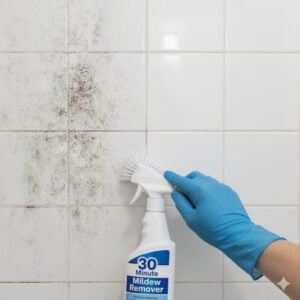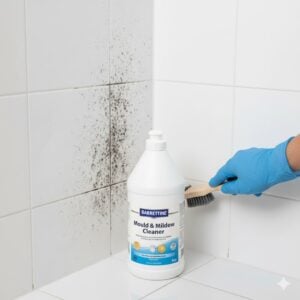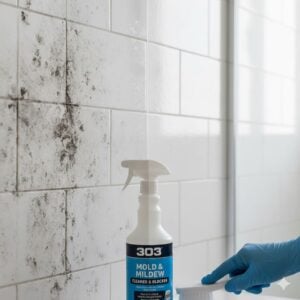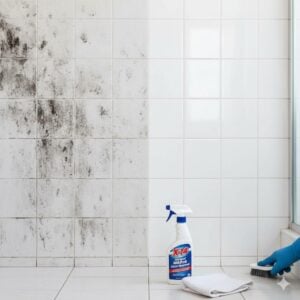A musty smell coming from your air conditioner is one of the most common complaints we hear from Dubai homeowners and tenants. At first, it might smell faint—like damp towels or a wet basement. But over time, it can become stronger, spreading through every room of your home. Not only is it unpleasant, it’s often a sign of mold, mildew, or bacteria growing inside your AC system. In this article, we will explain why your AC produces that musty odor, what it means for your health and comfort, and most importantly, what you can do to fix it properly and prevent it from coming back.
Table of Contents
Toggle1) Why Does My AC Smell Musty?
Air conditioning systems in Dubai work almost non-stop for most of the year. With the hot outdoor air and sealed apartments, AC units naturally collect condensation as they cool and dehumidify the air. That moisture, combined with dust and organic debris in the ducts, creates the perfect breeding ground for mold and mildew. The musty smell you notice is actually gases released by microbial growth inside the system.
Some of the most common causes include:
- Clogged or dirty filters – Dust, pet dander, and moisture trapped in filters can quickly grow mold colonies.
- Standing water in drain pans – If the condensate line is blocked, water sits and becomes stagnant, producing odor.
- Damp ductwork – Poor insulation or leaks allow moisture inside ducts, encouraging mildew.
- High indoor humidity – Bathrooms, kitchens, and laundry rooms can push extra moisture into the AC system.
The smell doesn’t mean your AC is “broken,” but it does mean it needs proper cleaning and maintenance before the problem worsens.
2) Is a Musty AC Smell Dangerous?
While not all musty smells are toxic, they do signal fungal or bacterial growth that can affect air quality. Prolonged exposure to spores and microbial compounds in recirculated AC air can cause symptoms like:
- Itchy eyes and runny nose
- Sneezing, coughing, or throat irritation
- Headaches or fatigue after time indoors
- Worsening asthma or allergy symptoms
Children, elderly residents, and those with respiratory conditions are most at risk. Over time, mold exposure indoors can lead to chronic sinus issues and “sick building” syndrome, where people only feel unwell at home or at work. Even if symptoms are mild, the constant musty odor creates discomfort and reduces the feeling of freshness in your space.
3) How Professionals Diagnose the Cause
When we inspect a musty-smelling AC in Dubai, we don’t just spray deodorizer and leave. Our process is designed to find the exact source so that you don’t waste money on temporary fixes:
- Visual inspection: Checking filters, drain pans, coils, and ducts for visible mold, dirt, or standing water.
- Moisture and humidity testing: Using meters to detect excess dampness inside ducts or insulation.
- Air quality testing: Measuring spore counts in the air to confirm if the smell is mold-related.
- Drain line check: Ensuring the condensate line is clear and flowing properly.
Only after diagnosing the cause can we recommend the right treatment—whether that’s deep cleaning, duct sanitization, or mold remediation.
4) How to Eliminate Musty Smell from AC
The right solution depends on what’s causing the smell. Here’s how professional AC cleaning typically works:
- Filter replacement: Old filters are discarded and replaced with high-quality, antimicrobial filters that prevent regrowth.
- Coil and pan cleaning: Evaporator coils and drain pans are scrubbed and disinfected to remove mold and biofilm.
- Duct cleaning and fogging: Specialized equipment removes dust and debris, followed by fogging with eco-friendly disinfectants to kill spores.
- Drain line flushing: Clearing blockages and ensuring condensate drains properly to prevent stagnant water.
For severe cases, we may also recommend UV light installation inside the AC unit. UV lights continuously kill microbes on coils and drain areas, preventing future odors and improving air quality long-term.
5) Preventing Musty Odors from Returning
Once the AC smells fresh again, keeping it that way requires consistent habits:
- Change filters every 1–3 months depending on usage and dust levels.
- Schedule professional AC cleaning at least once a year—twice if you live in a particularly humid area or notice frequent issues.
- Check humidity levels indoors; aim for 40–60%. Use a dehumidifier if levels stay high.
- Keep bathrooms and kitchens ventilated so moisture doesn’t get trapped in ducts.
- Inspect drain lines regularly to make sure they aren’t clogged.
These small steps keep your AC efficient, your home comfortable, and your indoor air clean.
6) When to Call for Professional Help
If the smell comes back within days of changing a filter or cleaning the surface, that’s a sign the issue is deeper inside the system. Persistent odors, visible mold in ducts, or health symptoms should never be ignored. Professional inspection ensures the root cause is fixed and not just covered up.
At Bio-On, we provide municipality-authorized cleaning and mold remediation services across Dubai and the UAE. We don’t just mask odors—we remove them at the source, restoring your AC and improving your indoor air quality.
Conclusion
A musty AC smell is more than just a nuisance—it’s a red flag that your cooling system may be harboring mold, mildew, or bacteria. Ignoring it only allows the problem to spread through your home and affect your health. By diagnosing the cause, cleaning thoroughly, and adopting good maintenance habits, you can enjoy fresh, clean air again. If your AC smells musty and won’t stay fresh no matter what you try, click the contact button on the right-middle of this post. We can help you identify the problem, clean it effectively, and keep your home healthy year-round.













